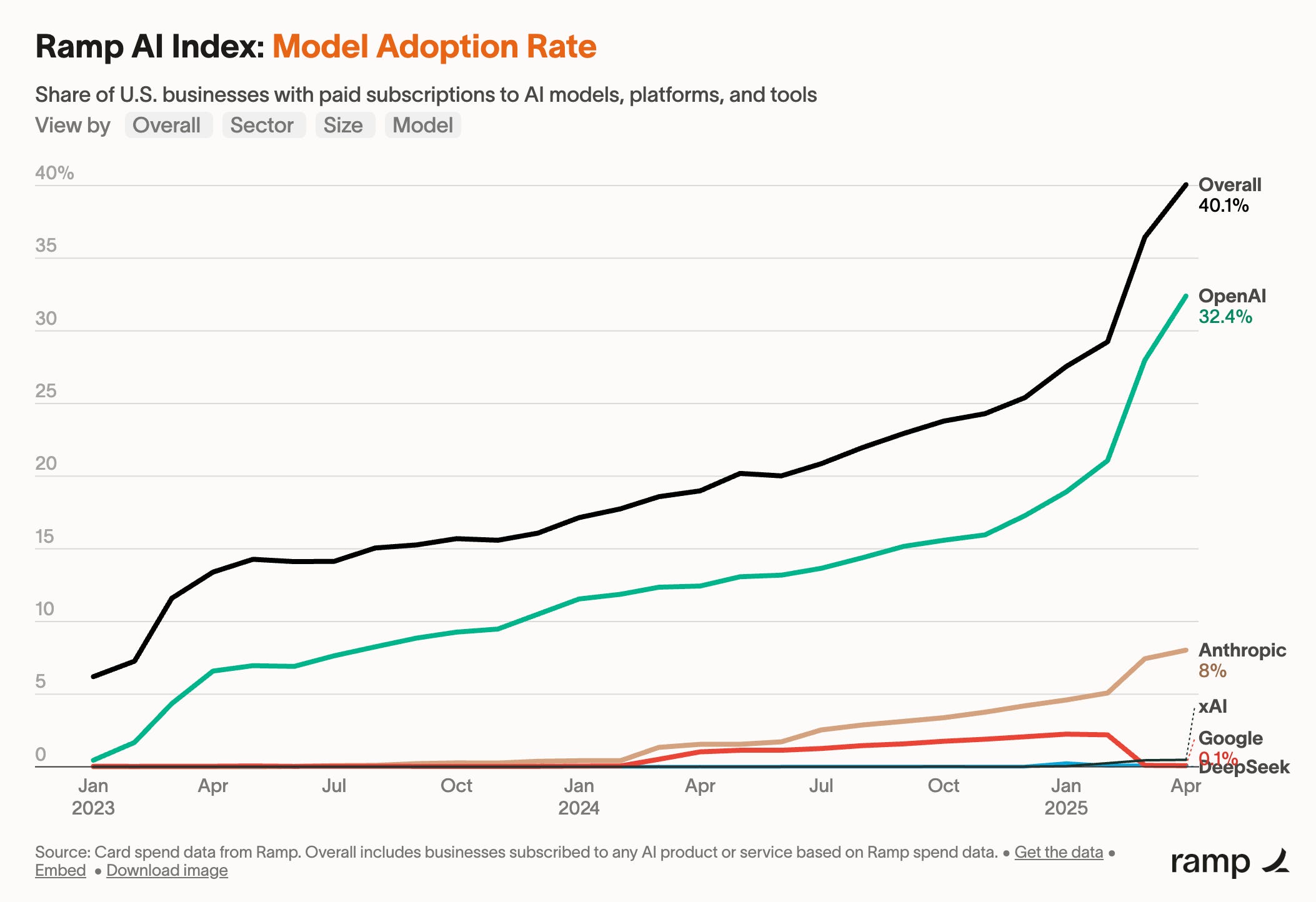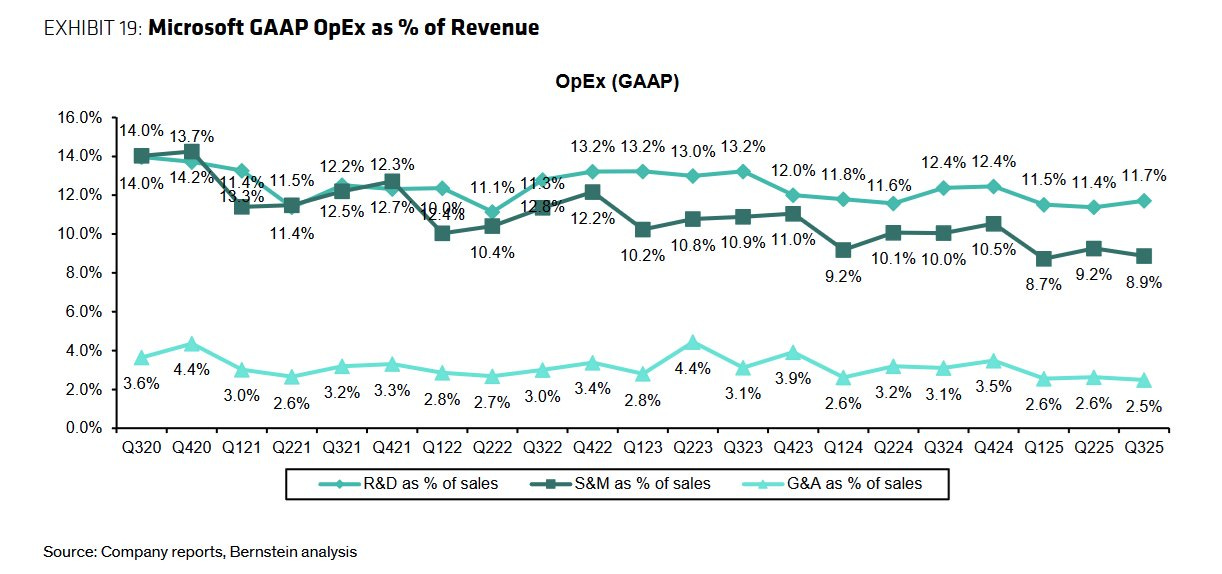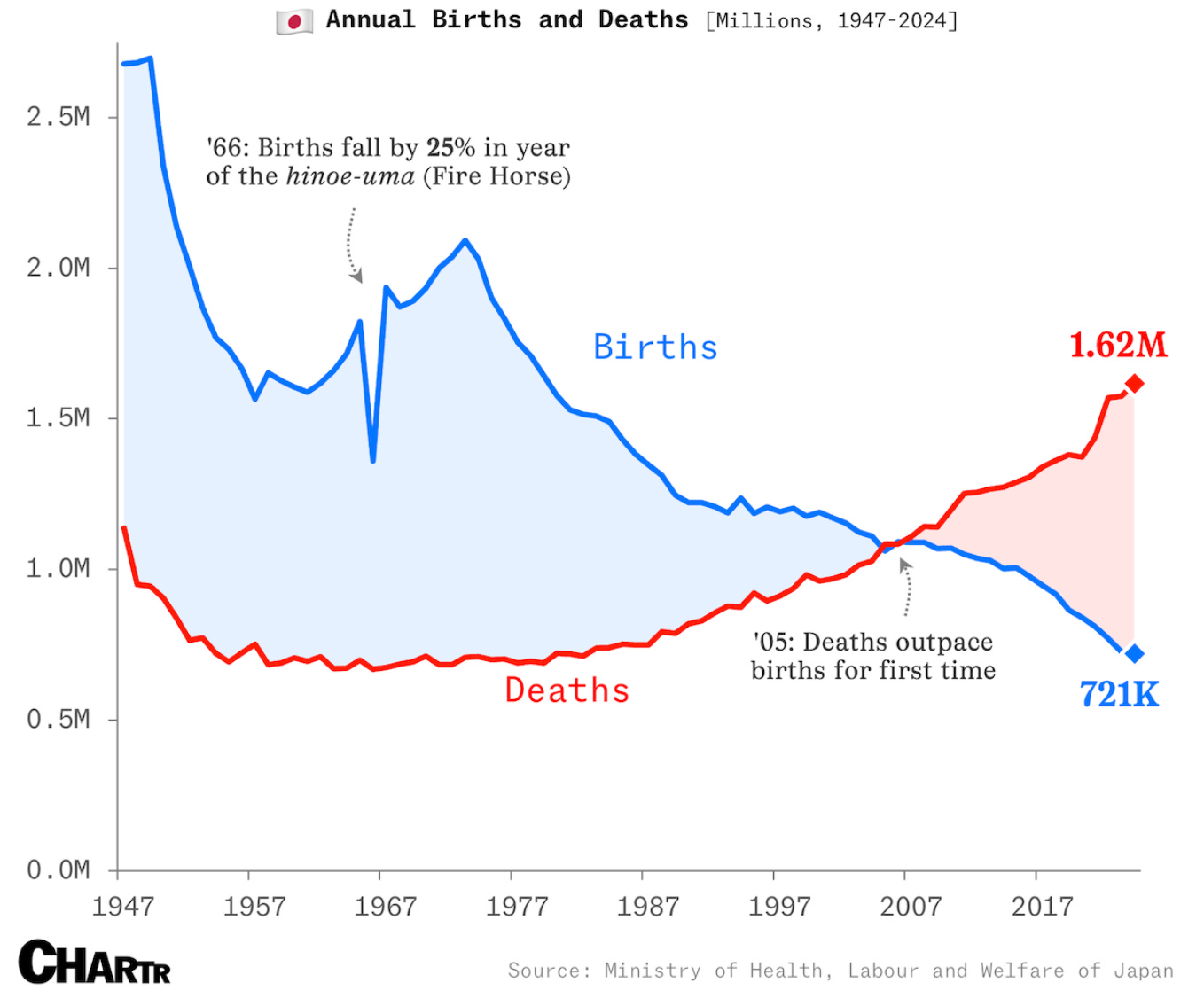564: OpenAI’s Ad Strategy, Why Nvidia Wins Again, Softbank's $350bn Oops, Jony Ive, Jeff Dean, Microsoft Cost Discipline, Crowdstrike’s CEO, and David Milch
"Small choices, massive consequences."
Everything is vague to a degree you do not realize till you have tried to make it precise.
—Bertrand Russell
🌱⏳ 📈 Some things erode us. Others grow us.
Give priority to the non-linear ones, on both sides. Always. Because over time, they shape everything, even when the effects are barely visible at first.
The good life is about moving away from what compounds negatively and leaning into what compounds positively. Small choices, massive consequences.
Relationships. Habits. Learning. Fitness. Curiosity. Skills. Wisdom. Resilience. Kindness. Integrity.
🌊 ⛵️ 🌊 By embracing the fury of the storm, I can redirect its power into the sails of my own journey.
🛀💭 I don’t know why I felt like writing this philosophical stuff this week.
There are weeks like that ¯\_(ツ)_/¯
✨🍁🧙♂️ Constellation Software had its annual meeting yesterday. I’ll likely write about it in more detail in the next Edition, once I’ve spent some time with the transcript. There’s a lot in there.
💚 🥃 🙏☺️ If you’re a free sub, I hope you’ll decide to become a paid supporter.
You’ll unlock access to paid editions, the private Discord, and get invited to the next supporter-only Zoom Q&As with me.
If you only get one good idea 💡 per year, it’ll more than pay for itself. If it makes you curious about new things, that’s priceless.
The next best thing? Share something you enjoyed here with someone who might like it too. Drop a screenshot and a link in your group chat! 💬
🏦 💰 Business & Investing 💳 💴
🤖🔀🏆 OpenAI’s Ad Strategy: Big Money, Titanic Risks, and Nvidia Wins Again 💰💰💰💰💰💰
Using its data from 30,000 businesses and billions of dollars in corporate spend through its platform, Ramp has been tracking AI adoption in U.S. businesses.
As you can see above, OpenAI is leading the pack *by a lot*.
Thanks to this success, in the enterprise but most importantly with consumers (that’s the truly rare thing! the big prize 🏆), OpenAI is in a position to become the next Big Tech.
But I don’t think it can get there with paid subscriptions alone.
They need their addressable market to be the whole planet. They are in a knife fight 🔪 with Google, Meta, Elon Musk/xAI, Anthropic/Amazon, etc, and these formidable adversaries all feel that AI is a top priority.
This is a game of titans, and OpenAI needs revenue at the scale of its competitors to keep up, or risk missing one of the future big step changes and fall behind.
Affiliate links are a good start, but the true opportunity lies with broader advertising — the same model that has allowed massive self-funded scaling at Facebook, Google Search, YouTube, Instagram, etc.
Advertising would allow OpenAI to keep its best products free without having to rely on VC dollars, but also to invest more in infrastructure, R&D, and ultimately roll out new products faster, solidifying their lead and making themselves harder to catch. A nice virtuous cycle 🔁
ChatGPT is a consumer brand now. It’s the Kleenex or Coca-Cola of AI.
That’s so valuable that OpenAI needs to avoid giving free users reason to check out competitors, because they may not come back. Retention is key: they want users to form habits, tell their friends, build up data and "memories", and eventually third-party logins so that they are super sticky.
If all their best products stay behind a paywall but competitors offer their versions of these cutting-edge products, power users may not mind paying, but casual users — and most users are casual by definition — will go to the free options.
This is part of human psychology.
We don’t mind paying for hardware and will spend a thousand bucks on an iPhone 📱 but most will think long and hard about that $1.99 app or that $20/month service (even if the value they get from these is 100x more than the price!).
LLMs are not differentiated enough for most uses to overcome this bias.
If ChatGPT went offline this week, most users would simply send the same queries to Gemini or Claude. If OpenAI swapped their own models for Claude or Gemini under the hood but kept the UX the same, most users wouldn’t notice, and some may even prefer it!
Enter Fidji Simo.
Her hiring — ex-Instacart CEO (grew their ad biz) and ex-Facebook (same) — makes it clear that OpenAI wants to monetize via ads.
There is no doubt many right and many wrong ways to do that. Hopefully, they can iterate and find a good way.
A bad approach would be anything that loses user trust by having advertisers influence answers to queries, f.ex. (I mean, e.g.) if the model recommends a certain brand of shoes because Nike won an ad auction👟
The best way I can think of to avoid that: keep ads clearly separate, labeled, and be explicit and transparent about the firewall between the LLM that answers questions and the separate system that looks at that chat and picks an ad to display. The LLM that answers users shouldn’t even be able to see the ads, it shouldn’t even know they exist 🙈
The beauty is that even if this model isn’t optimal, going from zero to one on such a large and rapidly growing user base will still result in a ton of high-margin revenue. Over time, they can figure out an ad model that is native to AI chatbots, improve targeting, etc, but they don’t have to launch with a perfect mousetrap to move the needle a lot 🪤🐁
If in a couple of years OpenAI has 1bn+ users, even with 1/10th the ARPU of Meta (especially in North America, where it is highest), that’s still tens of billions of revenue, most of which falls to the bottom line (but more realistically, can be re-invested in GPUs and talent).
Which brings me to my next point. Turning on the ad-money faucet is bullish for Nvidia for a few reasons:
It makes OpenAI even better capitalized, and they’ll spend most of that on compute.
That will pressure all competitors to keep up (“standing on tiptoes at a parade”).
This competition will mean free users have more access to the best AI models, driving even more compute per user (both because cutting-edge models use more, but also because better products are more useful, so they are used more).
More tokens, more models, more GPUs 🚀
🐜🤖🔮 The $350 Billion What-If: Nvidia, ARM, and SoftBank’s Historic Missed Opportunity 💸
Let’s imagine that Nvidia had successfully acquired ARM back in 2020 💭
The offer was $40bn back then, and it seemed high at the time, but it could be argued that it made sense for strategic reasons. Owning ARM would’ve given all kinds of new channels for Nvidia to distribute its IP and to widen the CUDA moat.
But that’s not how things went. ARM is now publicly traded and has a $125bn market cap.
In the alternate history, Softbank would’ve done pretty well since the deal involved $21.5 billion in Nvidia common stock, or approximately 44.3 million shares (pre-stock splits).
Assuming they held, which isn’t what they did when they actually were Nvidia’s biggest shareholder but sold right before the stock went vertical, but let’s assume they did: that equity stake would now be worth, after adjusting for the 4:1 split in 2021 and the 10:1 in 2024…
About 210 BILLION DOLLARS 😳
While I’m doing the math: if Masa Son had decided to hold Softbank’s 4.9% Nvidia stake that it bought for about $4bn, it would be worth about $140bn today, which is nearly double Softbank’s current market cap of ˜$75bn.
And if they had done both, held that stake + sold ARM to Nvidia (which may have made Nvidia equity even more valuable than it is today, but that’s unknowable), they could be sitting on around $350bn of Nvidia stock 🤯
$350 BILLION!
Oops 🎌🥲
🦅🇺🇸🧲 ←🧠💰 America’s Brand🏷️
How valuable is America's brand around the world? Both commercially and in attracting talent?
I struggle to think of a more valuable intangible asset on the planet 🤔
It follows, then, that strengthening and safeguarding that brand is *extremely* valuable, and damaging it is *deeply* destructive.
This isn’t easily captured by any single metric, but rather, it’s reflected in ways big and small in every city, every company, every university, port, airport, factory, and lab.
✂️ Microsoft Fire 3% of Workforce + Cost Discipline 💾
Last week, CrowdStrike announced it would lay off 5% of its employees, now it’s Microsoft’s turn:
Microsoft on Tuesday said that it’s laying off 3% of employees across all levels, teams and geographies, affecting about 6,000 people. [...]
Microsoft had 228,000 employees worldwide at the end of June. [...]
It’s likely Microsoft’s largest round of layoffs since the elimination of 10,000 roles in 2023.
Modest Proposal wrote, looking at the graph above:
every software CFO should have to benchmark themselves to this chart of Microsoft expenses and explain it to their BoardI guess you don’t get 55% EBITDA margins and 35.8% net income margins by accident! 😅
🦅 Crowdstrike’s CEO Gives Away Most of His Stock, Loses Super-Voting Powers 🎁
This one’s a bit of a head-scratcher:
CrowdStrike Chief Executive Officer George Kurtz disclosed last month that he’d gifted over $1 billion worth of his company’s stock to undisclosed recipients [...]
The disposition is the latest in a series of transactions that have slashed his voting power in CrowdStrike to 2.5% from 31% in 2022 [...]
The drawdown in his voting stake has been so dramatic that Kurtz in December triggered a clause eliminating all of CrowdStrike’s super-voting stock [...]
In addition to the gifted shares, Kurtz has personally sold shares worth more than $200 million since September 2022. [...]
In an unusual discrepancy, filings with the Securities and Exchange Commission show Kurtz has gifted over 11 million shares since 2022, while the company’s proxy statement released last week only shows his holdings decreasing by about two-thirds as much.
It’s not unusual for founders to sell part of their stake over time, but to reduce it so sharply via gifts, in such a short period, without explaining why… and to a level where he loses super-voting power? That makes me wonder what’s going on 😐
Is this just estate planning (the most likely explanation), or is there something else, like health issues, that is shortening his time horizon? (unlikely, but you never know)
At a time when large founder-led public companies are getting rarer, this can matter to shareholders.
Most of Kurtz’s stock dispositions have been classified as gifts, meaning the shares were transferred in exchange for no payment. Unlike some billionaires, Kurtz didn’t disclose the recipient in the filings.
It seems that not all the trusts are holding onto the shares:
Subsequent filings from four trusts show that about half of his gifted shares were transferred to them. Those trusts have in turn sold most of the shares they reported receiving, netting at least $1.2 billion in proceeds so far. (Source)
I’ll be curious to see if more details come out. I’m sure he’ll be asked about it at the next earnings call 🤔
🧪🔬 Science & Technology 🧬 🔭
🗣️🗣️ Jony Ive Conversation with Patrick Collison 🍎🔍🧑🎨
Very interesting conversation between Patrick Collison and Jony Ive, Apple’s former lead designer and close partner to Steve Jobs for the creation of iconic products like the iMac, iPod, iPhone, and iPad.
Here are my highlights.
First, on design as a testament to values:
Ive: What I realized was that what we make stands testament to who we are. And what we make describes our values. It describes our preoccupations. It describes beautifully, succinctly, our preoccupation.
You can look at something and it can either tell you, ‘I was designed to meet a price point at a certain time so I hit the schedule,’ or you can try and design something that genuinely attempts to move the species on. [...]
If something doesn't work it's ugly, I always get frustrated when people try to set up a false opposition between utility and aesthetics.
The insidious lie of measurable metrics:
Ive: People generally want to talk about product attributes that you can measure easily with a number.
The problem is, much of what you know, much of my contribution and the contribution of designers and other creatives, you can't measure easily with a number.
The insidious lie follows, which is: we spend all our time talking about attributes because we can easily measure them, therefore this is all that matters. And that's a lie.
It's important, but it's a partial truth. All of the stuff that I think designers and other creatives can contribute to an experience or to a product that can make it delightful to use and joyful to use as well as more productive, are equally important.
On creating a team and creative culture:
Ive: There’s nothing more important to me than the creative team… if you think about the evolution of an idea, it always starts off as a thought and then a tentative discussion… These ethereal thoughts, these fragile concepts, are precarious.
And I think a small team of people that really trust each other, and love each other, who care about each other… if you care, you know, then you might be in danger of actually listening.
As a practice, it’s very good to make things for each other. Every Friday morning, I asked that one person on the design team would make breakfast for the whole team and we took it in turns. It puts you in a lovely place. It makes you more worried about them than you. It makes you vulnerable and it makes them grateful. And that starts to define quite a lovely culture. [...]
we would take it in turns to have the design team come to our homes and we would spend a day working in our home. And it was in a very, very powerful way, encouraging us in our practice to do good work and in building the team.
If you’re designing for people and you’re in someone’s living room, sat on their sofa or sat on their floor, and your sketchbook is on their coffee table—of course you think differently, don’t you? Of course your preoccupation, where your mind wanders, is so different than if you’re sat in a typical corporate conference room.
On *actually* listening:
Ive: One of the things that terrifies me—I know that I've missed really amazing ideas that came from a quiet place, from a quiet person.
And that really scares me because I don't know what I've missed.
I recommend the whole thing. It’s a good convo, and Ive clearly still has that fire going, he’s not retired and out of the game.
We know he’s been working on some projects with OpenAI, so we may see new things in the not-too-distant future.
🔧 The Legendary Jeff Dean Talks about Virtual Engineers 🧰
A new interview with Jeff Dean conducted by Bill Coughran, who was at Bell Labs and later joined Google in 2003. Bill’s engineering responsibilities at Google included Chrome, YouTube, Maps, Google Search, underlying infrastructure systems, security, and research. Not a bad résumé!
Two titans of systems engineering, casually discussing the future of software like it’s Wednesday.
It’s like if Obi-Wan interviewed Yoda — but for distributed systems.
🤖🌎 AI’s End-Market is Bigger than Earth’s Population 🤔
You know how cellphones, and then smartphones, went from 0% to basically 100% of the adult population in a couple of decades?
AI use is clearly going that way, but faster because it’s easier to adopt a service/software than hardware, and it’s cheaper/free for the end user.
Near-frictionless diffusion + high product-market fit/utility! 🏎️
But while you can’t sell more phones than there are people (day phone/night phone maniacs excluded), AI has two big levers:
More usage per person as users embed it into their lives and the utility of the products increases (just like people use Google Search or Maps far more today than when they first launched).
Non-human users: There’s likely to be a world where most usage comes from non-humans. AI agents, automated systems, and various applications will be sending massive numbers of queries to other AI services.
In other words, the upper limit of potential customers for AI is higher than the population of Earth.
We’re building tools for minds, and not all of them will be human. 🧠🤖
🎌 Fertility Watch, Japan Edition 🤰🏻🙅🏻♀️
Preliminary data from the Ministry of Health, Labour and Welfare, published Thursday, found that there were just 720,988 births in Japan in 2024 — a 5% decline from the year before and the lowest figure since records began in 1899 [...]
Alongside the number of deaths reaching a new high of ~1.62 million, this puts Japan’s natural population loss at nearly 900,000 people
🎨 🎭 The Arts & History 👩🎨 🎥
🤠 David Milch on Creating Deadwood and the Power of Language ✍️🪄
The only truly great scene is actually about the opposite of what it appears to be about.
–David Milch paraphrasing Herman MelvilleHe’s just a pleasure to listen to.
As you surely know, Deadwood is my favorite show of all time. I’ve seen it 5-6 times (I lost track), and I’ve recently been slowly savoring Milch’s memoirs 📖
Keith Carradine, who plays Wild Bill Hickok on the show, interviewed Milch about creating the show for the Blu-ray extras. It was recorded at the time, and it’s a great behind-the-scenes conversation. It’s storytelling spellcraft.
I enjoyed it and think you will probably like it too.
(If you want more, this other Milch interview about mixing history with fiction in storytelling is great too)







The mere fact ChatGPT has such an impressive user despite not being entertainment, commerce or social network based is astounding. Love we have something that is so rapidly disseminated which appeals to our yearning to better ourselves rather than appeals to our vices/base desires.
Deadwood, Milch. Nuff said! 😎